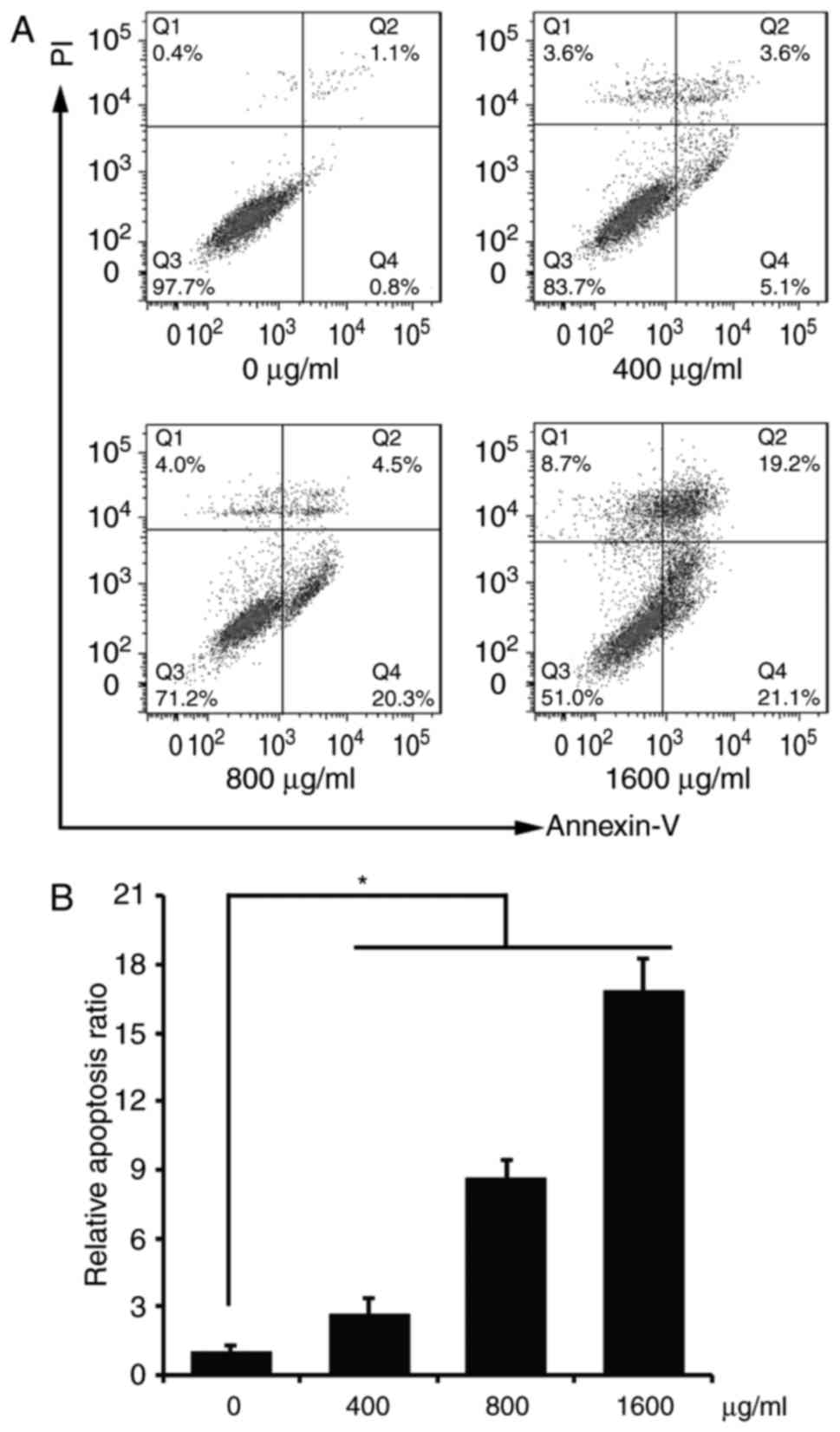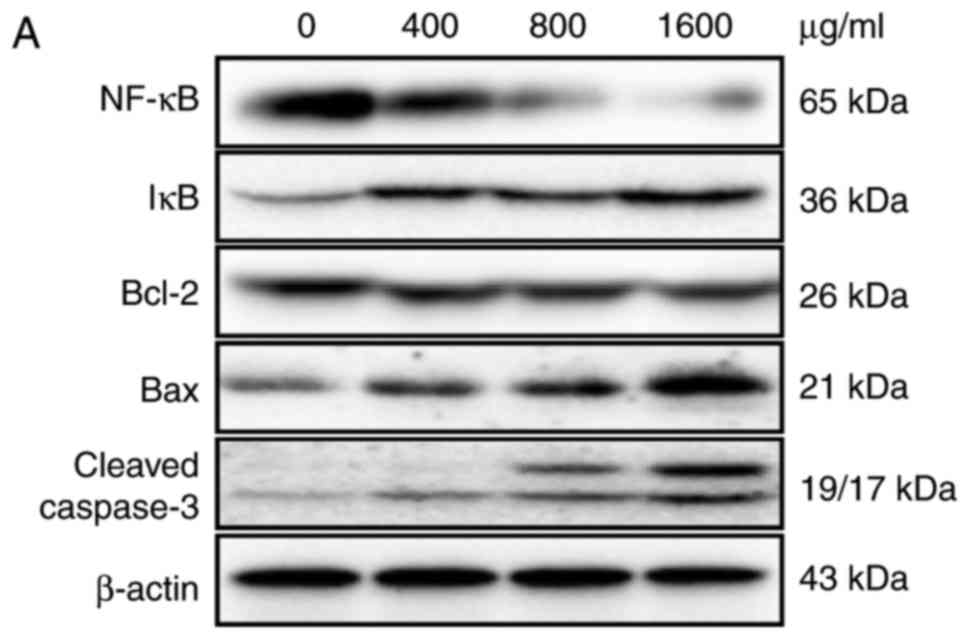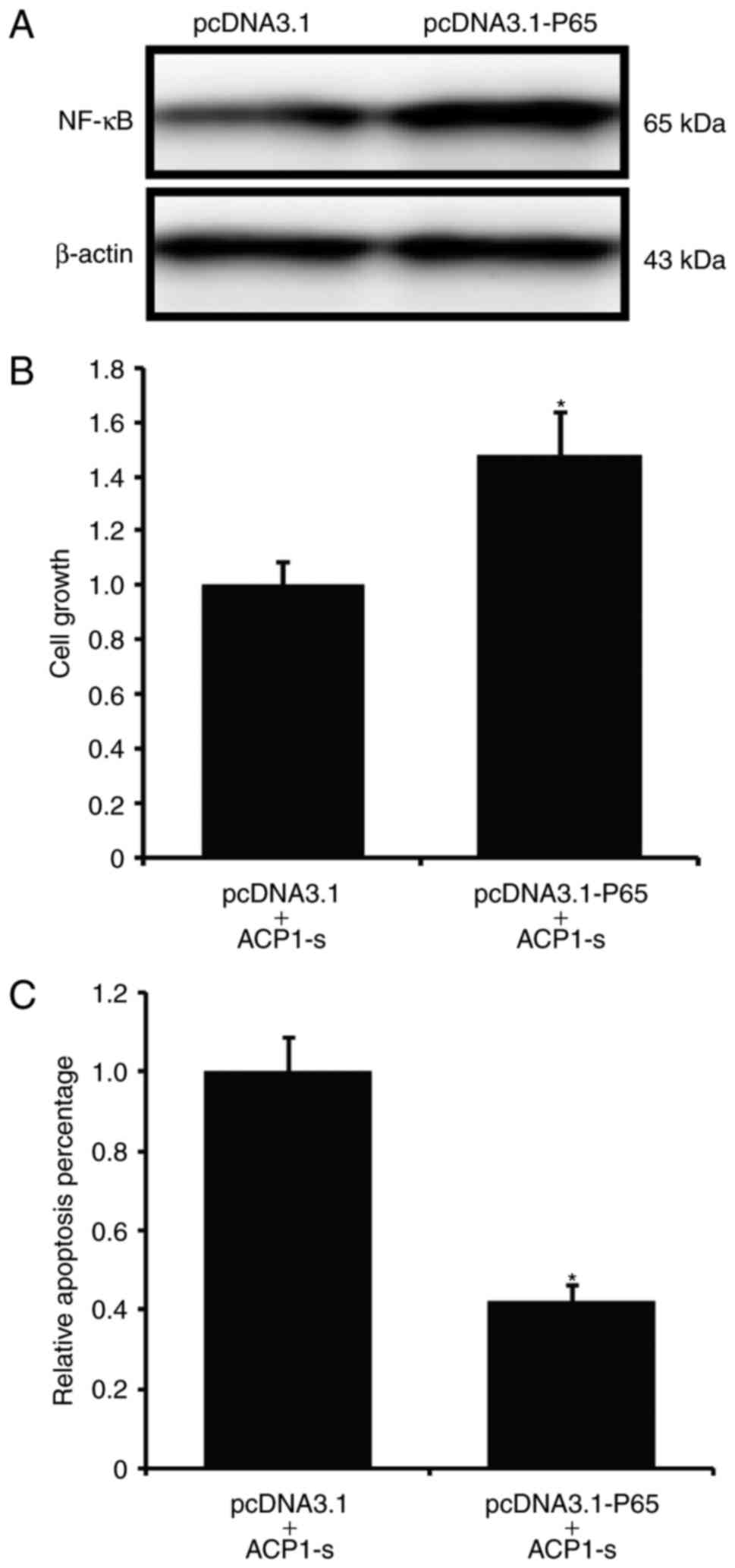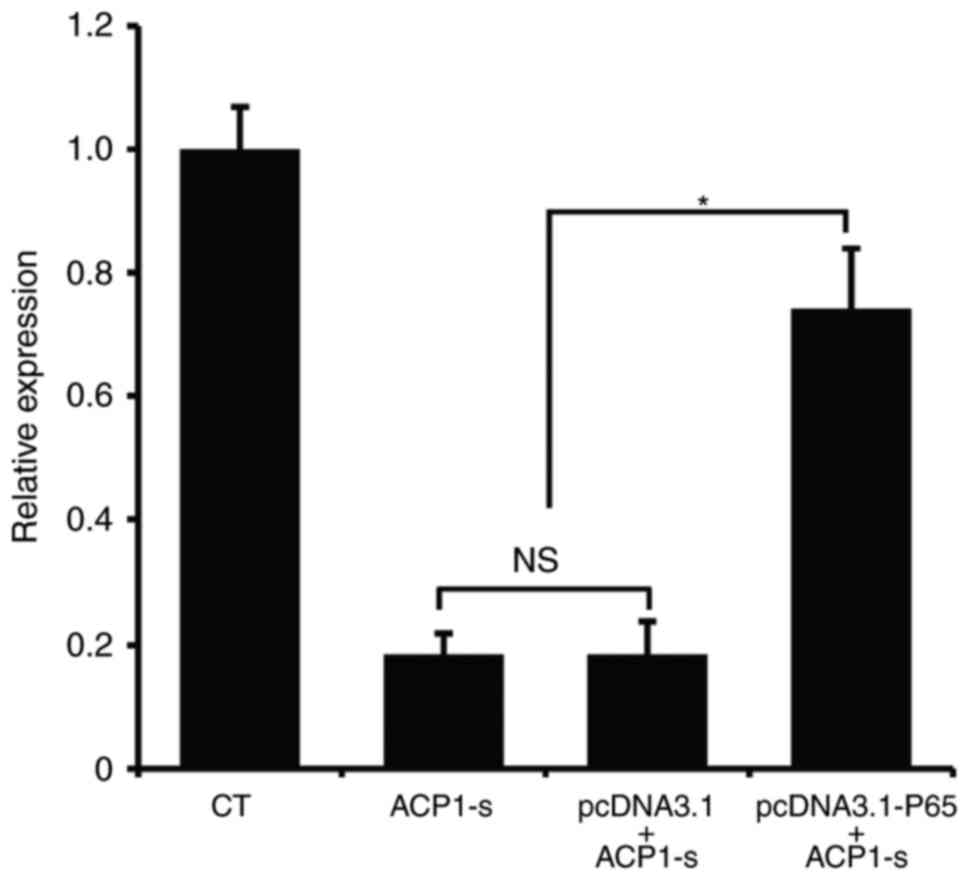|
1
|
Cohen I, Tagliaferri M and Tripathy D:
Traditional Chinese medicine in the treatment of breast cancer.
Semin Oncol. 29:563–574. 2002. View Article : Google Scholar : PubMed/NCBI
|
|
2
|
Xu ZY, Jin CJ, Zhou CC, Wang ZQ, Zhou WD,
Deng HB, Zhang M, Su W and Cai XY: Treatment of advanced
non-small-cell lung cancer with Chinese herbal medicine by stages
combined with chemotherapy. J Cancer Res Clin Oncol. 137:1117–1122.
2011. View Article : Google Scholar : PubMed/NCBI
|
|
3
|
Mu J, Liu T, Jiang L, Wu X, Cao Y, Li M,
Dong Q, Liu Y and Xu H: The traditional Chinese medicine baicalein
potently inhibits gastric cancer cells. J Cancer. 7:453–461. 2016.
View Article : Google Scholar : PubMed/NCBI
|
|
4
|
Li W, Li C, Zheng H, Chen G and Hua B:
Therapeutic targets of Traditional Chinese medicine for colorectal
cancer. J Tradit Chin Med. 36:243–249. 2016. View Article : Google Scholar : PubMed/NCBI
|
|
5
|
Cao P, Cai X, Lu W, Zhou F and Huo J:
Growth inhibition and induction of apoptosis in SHG-44 glioma cells
by Chinese medicine formula ‘Pingliu Keli’. Evid Based Complement
Alternat Med. 2011:pii:9582432011. View Article : Google Scholar
|
|
6
|
Zhang FY, Hu Y, Que ZY, Wang P, Liu YH,
Wang ZH and Xue YX: Shikonin inhibits the migration and invasion of
human glioblastoma cells by targeting phosphorylated β-catenin and
phosphorylated PI3K/Akt: A potential mechanism for the anti-glioma
efficacy of a traditional Chinese herbal medicine. Int J Mol Sci.
16:23823–23848. 2015. View Article : Google Scholar : PubMed/NCBI
|
|
7
|
Soubannier V and Stifani S: NF-kappaB
signalling in glioblastoma. Biomedicines. 5:292017. View Article : Google Scholar :
|
|
8
|
Napetschnig J and Wu H: Molecular basis of
NF-κB signaling. Annu Rev Biophys. 42:443–468. 2013. View Article : Google Scholar : PubMed/NCBI
|
|
9
|
Davis JN, Kucuk O and Sarkar FH: Genistein
inhibits NF-kappa B activation in prostate cancer cells. Nutr
Cancer. 35:167–174. 1999. View Article : Google Scholar : PubMed/NCBI
|
|
10
|
Hussain AR, Ahmed M, Al-Jomah NA, Khan AS,
Manogaran P, Sultana M, Abubaker J, Platanias LC, Al-Kuraya KS and
Uddin S: Curcumin suppresses constitutive activation of nuclear
factor-kappaB and requires functional Bax to induce apoptosis in
Burkitt's lymphoma cell lines. Mol Cancer Ther. 7:3318–3329. 2008.
View Article : Google Scholar : PubMed/NCBI
|
|
11
|
Estrov Z, Shishodia S, Faderl S, Harris D,
Van Q, Kantarjian HM, Talpaz M and Aggarwal BB: Resveratrol blocks
interleukin-1beta-induced activation of the nuclear transcription
factor NF-kappaB, inhibits proliferation, causes S-phase arrest,
and induces apoptosis of acute myeloid leukemia cells. Blood.
102:987–995. 2003. View Article : Google Scholar : PubMed/NCBI
|
|
12
|
Kundu JK, Shin YK and Surh YJ: Resveratrol
modulates phorbol ester-induced pro-inflammatory signal
transduction pathways in mouse skin in vivo: NF-kappaB and AP-1 as
prime targets. Biochem Pharmacol. 72:1506–1515. 2006. View Article : Google Scholar : PubMed/NCBI
|
|
13
|
Huang CS, Fan YE, Lin CY and Hu ML:
Lycopene inhibits matrix metalloproteinase-9 expression and
down-regulates the binding activity of nuclear factor-kappa B and
stimulatory protein-1. J Nutr Biochem. 18:449–456. 2007. View Article : Google Scholar : PubMed/NCBI
|
|
14
|
Tong H, Feng K, Zhang X, Tian D, Liu Y,
Chu X and Sun X: Purification and chemical compositions of a
proteoglycan isolated from Aconitum coreanum. Chemistry Natural
Compounds. 46:329–330. 2010. View Article : Google Scholar
|
|
15
|
Zhang Y, Wu W, Kang L, Yu D and Liu C:
Effect of Aconitum coreanum polysaccharide and its sulphated
derivative on the migration of human breast cancer MDA-MB-435s
cell. Int J Biol Macromol. 103:477–483. 2017. View Article : Google Scholar : PubMed/NCBI
|
|
16
|
Xu Y, Song S, Wei Y, Wang F, Zhao M, Guo J
and Zhang J: Sulfated modification of the polysaccharide from
Sphallerocarpus gracilis and its antioxidant activities. Int J Biol
Macromol. 87:180–190. 2016. View Article : Google Scholar : PubMed/NCBI
|
|
17
|
Xiao LJ, Chen YY, Lin P, Zou HF, Lin F,
Zhao LN, Li D, Guo L, Tang JB, Zheng XL and Yu XG: Hypoxia
increases CX3CR1 expression via HIF-1 and NF-κB in
androgen-independent prostate cancer cells. Int J Oncol.
41:1827–1836. 2012. View Article : Google Scholar : PubMed/NCBI
|
|
18
|
Yang G, Xu Y, Chen X and Hu G: IFITM1
plays an essential role in the antiproliferative action of
interferon-gamma. Oncogene. 26:594–603. 2007. View Article : Google Scholar : PubMed/NCBI
|
|
19
|
Chao J, Dai Y, Verpoorte R, Lam W, Cheng
YC, Pao LH, Zhang W and Chen S: Major achievements of
evidence-based traditional Chinese medicine in treating major
diseases. Biochem Pharmacol. 139:94–104. 2017. View Article : Google Scholar : PubMed/NCBI
|
|
20
|
Jacobo-Herrera NJ, Jacobo-Herrera FE,
Zentella-Dehesa A, Andrade-Cetto A, Heinrich M and Pérez-Plasencia
C: Medicinal plants used in Mexican traditional medicine for the
treatment of colorectal cancer. J Ethnopharmacol. 179:391–402.
2016. View Article : Google Scholar : PubMed/NCBI
|
|
21
|
Anjum K, Shagufta BI, Abbas SQ, Patel S,
Khan I, Shah SAA, Akhter N and Hassan SSU: Current status and
future therapeutic perspectives of glioblastoma multiforme (GBM)
therapy: A review. Biomed Pharmacother. 92:681–689. 2017.
View Article : Google Scholar : PubMed/NCBI
|
|
22
|
Annovazzi L, Mellai M and Schiffer D:
Chemotherapeutic drugs: DNA damage and repair in glioblastoma.
Cancers (Basel). 9:pii: E572017. View Article : Google Scholar
|
|
23
|
Sarkaria JN, Kitange GJ, James CD, Plummer
R, Calvert H, Weller M and Wick W: Mechanisms of chemoresistance to
alkylating agents in malignant glioma. Clin Cancer Res.
14:2900–2908. 2008. View Article : Google Scholar : PubMed/NCBI
|
|
24
|
Perry MC, Demeule M, Régina A, Moumdjian R
and Béliveau R: Curcumin inhibits tumor growth and angiogenesis in
glioblastoma xenografts. Mol Nutr Food Res. 54:1192–1201.
2010.PubMed/NCBI
|
|
25
|
Dhandapani KM, Mahesh VB and Brann DW:
Curcumin suppresses growth and chemoresistance of human
glioblastoma cells via AP-1 and NFkappaB transcription factors. J
Neurochem. 102:522–538. 2007. View Article : Google Scholar : PubMed/NCBI
|
|
26
|
Leone S, Basso E, Polticelli F and Cozzi
R: Resveratrol acts as a topoisomerase II poison in human glioma
cells. Int J Cancer. 131:E173–E178. 2012. View Article : Google Scholar : PubMed/NCBI
|
|
27
|
Ryu J, Ku BM, Lee YK, Jeong JY, Kang S,
Choi J, Yang Y, Lee DH, Roh GS, Kim HJ, et al: Resveratrol reduces
TNF-α-induced U373MG human glioma cell invasion through regulating
NF-κB activation and uPA/uPAR expression. Anticancer Res.
31:4223–4230. 2011.PubMed/NCBI
|
|
28
|
Zhu T, Zhao Y, Zhang J, Li L, Zou L, Yao Y
and Xu Y: β-Elemene inhibits proliferation of human glioblastoma
cells and causes cell-cycle G0/G1 arrest via mutually compensatory
activation of MKK3 and MKK6. Int J Oncol. 38:419–426.
2011.PubMed/NCBI
|
|
29
|
Zhao YS, Zhu TZ, Chen YW, Yao YQ, Wu CM,
Wei ZQ, Wang W and Xu YH: B-elemene inhibits Hsp90/Raf-1 molecular
complex inducing apoptosis of glioblastoma cells. J Neurooncol.
107:307–314. 2012. View Article : Google Scholar : PubMed/NCBI
|
|
30
|
Sun Q, Dong M, Wang Z, Wang C, Sheng D, Li
Z, Huang D and Yuan C: Selenium-enriched polysaccharides from
Pyracantha fortuneana (Se-PFPs) inhibit the growth and invasive
potential of ovarian cancer cells through inhibiting β-catenin
signaling. Oncotarget. 7:28369–28383. 2016.PubMed/NCBI
|
|
31
|
Chen Y, Liu ZJ, Liu J, Liu LK, Zhang ES
and Li WL: Inhibition of metastasis and invasion of ovarian cancer
cells by crude polysaccharides from rosa roxburghii tratt in vitro.
Asian Pac J Cancer Prev. 15:10351–10354. 2014. View Article : Google Scholar : PubMed/NCBI
|
|
32
|
Xu J, Chen D, Liu C, Wu XZ, Dong CX and
Zhou J: Structural characterization and anti-tumor effects of an
inulin-type fructan from Atractylodes chinensis. Int J Biol
Macromol. 82:765–771. 2016. View Article : Google Scholar : PubMed/NCBI
|
|
33
|
Han SB, Lee CW, Kang JS, Yoon YD, Lee KH,
Lee K, Park SK and Kim HM: Acidic polysaccharide from Phellinus
linteus inhibits melanoma cell metastasis by blocking cell adhesion
and invasion. Int Immunopharmacol. 6:697–702. 2006. View Article : Google Scholar : PubMed/NCBI
|
|
34
|
Cahill KE, Morshed RA and Yamini B:
Nuclear factor-κB in glioblastoma: Insights into regulators and
targeted therapy. Neuro Oncol. 18:329–339. 2016. View Article : Google Scholar : PubMed/NCBI
|
|
35
|
Cheng D, Zhang X, Meng M, Han L, Li C, Hou
L, Qi W and Wang C: Inhibitory effect on HT-29 colon cancer cells
of a water-soluble polysaccharide obtained from highland barley.
Int J Biol Macromol. 92:88–95. 2016. View Article : Google Scholar : PubMed/NCBI
|
|
36
|
Zhang Y, Li Q, Wang J, Cheng F, Huang X,
Cheng Y and Wang K: Polysaccharide from Lentinus edodes combined
with oxaliplatin possesses the synergy and attenuation effect in
hepatocellular carcinoma. Cancer Lett. 377:117–125. 2016.
View Article : Google Scholar : PubMed/NCBI
|
|
37
|
Chipuk JE, Moldoveanu T, Llambi F, Parsons
MJ and Green DR: The BCL-2 family reunion. Mol Cell. 37:299–310.
2010. View Article : Google Scholar : PubMed/NCBI
|
|
38
|
Wang X: The expanding role of mitochondria
in apoptosis. Genes Dev. 15:2922–2933. 2001.PubMed/NCBI
|
|
39
|
Viatour P, Bentires-Alj M, Chariot A,
Deregowski V, de Leval L, Merville MP and Bours V: NF-kappa B2/p100
induces Bcl-2 expression. Leukemia. 17:1349–1356. 2003. View Article : Google Scholar : PubMed/NCBI
|
|
40
|
Chamberlain MC: Temozolomide: Therapeutic
limitations in the treatment of adult high-grade gliomas. Expert
Rev Neurother. 10:1537–1544. 2010. View Article : Google Scholar : PubMed/NCBI
|
|
41
|
Wu K, Wang ZZ, Liu D and Qi XR:
Pharmacokinetics, brain distribution, release and blood-brain
barrier transport of Shunaoxin pills. J Ethnopharmacol.
151:1133–1140. 2014. View Article : Google Scholar : PubMed/NCBI
|



















